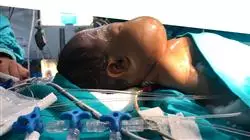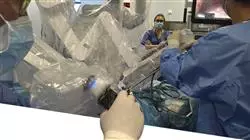University certificate
The world's largest faculty of medicine”
Introduction to the Program
It delves into the different services of Pediatric Surgery, through the experience of leading surgeons and experts in the field"

The intense health care activity to which specialists in the area of Pediatric Surgery are subjected makes it extremely complex to keep up to date with all the documentation and new advances that arise. These, precisely, are not few, since in recent years both therapeutics and diagnostic and surgical techniques have advanced at a particularly accelerated pace.
So much so that minimally invasive surgery is the order of the day. Whether due to developments in visualization technology, such as fluorescence in certain processes or to the increasingly prominent presence of robotic devices and laparoscopic techniques, the fact is that these advances have led to a better prognosis and evolution in treatments in practically all areas.
This entails a preferential field of action for the specialist, who, despite the difficulties, must follow a continuous updating process. The TECH Global University program solves precisely the biggest problem when taking on this task, as it is offered in a completely online format, giving the specialist the necessary freedom to take it on at his own pace.
All the contents available in this master's degree are created by an extensive teaching staff of renowned reference in the surgical field. Therefore, the specialist will have access to detailed videos, analysis of real cases and more multimedia resources based on the most rigorous clinical practice. Throughout the entire syllabus, fields such as general digestive surgery, urological surgery, airway surgery, thoracic surgery, head and neck surgery, maxillofacial surgery, plastic surgery or oncological surgery, among many other branches of maximum interest, will be examined.
The absence of on-site classes and fixed schedules allows the specialist to distribute the study time according to his or her own interests. This makes this program in Pediatric Surgery a perfect academic option to get up to date in the field, relying on an exceptional teaching staff and the most effective teaching methodology.
Get updated on cutting-edge techniques such as Exit surgery, robotic surgery and laparoscopic procedures in children"
This Professional master’s degree in Pediatric Surgery contains the most complete and up-to-date scientific program on the market. The most important features include:
- The development of practical cases presented by experts in Pediatric Surgery
- The graphic, schematic, and practical contents with which they are created, provide scientific and practical information on the disciplines that are essential for professional practice
- Practical exercises where self-assessment can be used to improve learning
- Its special emphasis on innovative methodologies
- Theoretical lessons, questions to the expert, debate forums on controversial topics, and individual reflection assignments
- Content that is accessible from any fixed or portable device with an Internet connection
Get up to date in the current state of transplants and the most advanced fetal surgery, with a vast agenda that covers a multitude of current pathologies"
The program includes in its teaching staff professionals of the field who pour into this training the experience of their work, in addition to recognized specialists from reference societies and prestigious universities.
Its multimedia content, developed with the latest educational technology, will allow the professional a situated and contextual learning, that is, a simulated environment that will provide an immersive training programmed to train in real situations.
The design of this program focuses on Problem-Based Learning, in which the professional will have to try to solve the different professional practice situations that will arise throughout the academic course. For this purpose, the student will be assisted by an innovative interactive video system created by renowned experts.
Access a multimedia library where you will review real cases and practical approaches to a multitude of pediatric surgical pathologies"

Distribute the course load at your own pace, downloading all the content from any device with internet connection"
Why study at TECH?
TECH is the world’s largest online university. With an impressive catalog of more than 14,000 university programs available in 11 languages, it is positioned as a leader in employability, with a 99% job placement rate. In addition, it relies on an enormous faculty of more than 6,000 professors of the highest international renown.

Study at the world's largest online university and guarantee your professional success. The future starts at TECH”
The world’s best online university according to FORBES
The prestigious Forbes magazine, specialized in business and finance, has highlighted TECH as “the world's best online university” This is what they have recently stated in an article in their digital edition in which they echo the success story of this institution, “thanks to the academic offer it provides, the selection of its teaching staff, and an innovative learning method aimed at educating the professionals of the future”
A revolutionary study method, a cutting-edge faculty and a practical focus: the key to TECH's success.
The most complete study plans on the university scene
TECH offers the most complete study plans on the university scene, with syllabuses that cover fundamental concepts and, at the same time, the main scientific advances in their specific scientific areas. In addition, these programs are continuously being updated to guarantee students the academic vanguard and the most in-demand professional skills. In this way, the university's qualifications provide its graduates with a significant advantage to propel their careers to success.
TECH offers the most comprehensive and intensive study plans on the current university scene.
A world-class teaching staff
TECH's teaching staff is made up of more than 6,000 professors with the highest international recognition. Professors, researchers and top executives of multinational companies, including Isaiah Covington, performance coach of the Boston Celtics; Magda Romanska, principal investigator at Harvard MetaLAB; Ignacio Wistumba, chairman of the department of translational molecular pathology at MD Anderson Cancer Center; and D.W. Pine, creative director of TIME magazine, among others.
Internationally renowned experts, specialized in different branches of Health, Technology, Communication and Business, form part of the TECH faculty.
A unique learning method
TECH is the first university to use Relearning in all its programs. It is the best online learning methodology, accredited with international teaching quality certifications, provided by prestigious educational agencies. In addition, this disruptive educational model is complemented with the “Case Method”, thereby setting up a unique online teaching strategy. Innovative teaching resources are also implemented, including detailed videos, infographics and interactive summaries.
TECH combines Relearning and the Case Method in all its university programs to guarantee excellent theoretical and practical learning, studying whenever and wherever you want.
The world's largest online university
TECH is the world’s largest online university. We are the largest educational institution, with the best and widest online educational catalog, one hundred percent online and covering the vast majority of areas of knowledge. We offer a large selection of our own degrees and accredited online undergraduate and postgraduate degrees. In total, more than 14,000 university degrees, in eleven different languages, make us the largest educational largest in the world.
TECH has the world's most extensive catalog of academic and official programs, available in more than 11 languages.
Google Premier Partner
The American technology giant has awarded TECH the Google Google Premier Partner badge. This award, which is only available to 3% of the world's companies, highlights the efficient, flexible and tailored experience that this university provides to students. The recognition as a Google Premier Partner not only accredits the maximum rigor, performance and investment in TECH's digital infrastructures, but also places this university as one of the world's leading technology companies.
Google has positioned TECH in the top 3% of the world's most important technology companies by awarding it its Google Premier Partner badge.
The official online university of the NBA
TECH is the official online university of the NBA. Thanks to our agreement with the biggest league in basketball, we offer our students exclusive university programs, as well as a wide variety of educational resources focused on the business of the league and other areas of the sports industry. Each program is made up of a uniquely designed syllabus and features exceptional guest hosts: professionals with a distinguished sports background who will offer their expertise on the most relevant topics.
TECH has been selected by the NBA, the world's top basketball league, as its official online university.
The top-rated university by its students
Students have positioned TECH as the world's top-rated university on the main review websites, with a highest rating of 4.9 out of 5, obtained from more than 1,000 reviews. These results consolidate TECH as the benchmark university institution at an international level, reflecting the excellence and positive impact of its educational model.” reflecting the excellence and positive impact of its educational model.”
TECH is the world’s top-rated university by its students.
Leaders in employability
TECH has managed to become the leading university in employability. 99% of its students obtain jobs in the academic field they have studied, within one year of completing any of the university's programs. A similar number achieve immediate career enhancement. All this thanks to a study methodology that bases its effectiveness on the acquisition of practical skills, which are absolutely necessary for professional development.
99% of TECH graduates find a job within a year of completing their studies.
Professional Master's Degree in Pediatric Surgery
Pediatric surgery is a branch of medicine that deals with the diagnosis, treatment and prevention of diseases and injuries in children from birth to adolescence. Today, pediatric surgery is a medical specialty in high demand and its importance is increasing due to the growing need for complex pediatric surgery. Specialization in pediatric surgery is essential for any medical professional who wants to work with children, as it allows to effectively address the specific medical conditions of pediatric patients. In addition, professional development in medicine involves acquiring specialized knowledge in this branch of medicine to provide the comprehensive medical care that pediatric patients need. For this reason, taking the Professional Master's Degree in Pediatric Surgery at TECH will provide you with a complete and up-to-date professional background in the area, covering everything from surgical patient management and trauma to the latest developments in pediatric robotic surgery.
You will develop multiple skills immediately with 100% online study
With this Professional Master's Degree in Pediatric Surgery, you will be able to specialize in general and digestive pediatric surgery, delving into the study of chronic inflammatory bowel diseases in pediatrics, digestive functional tests, anorectal manometry and new therapies for the study and treatment of incontinence and constipation. In addition, you will learn in depth about pediatric liver transplantation, neonatal surgery and the management of tumors in pediatric patients, including benign and malignant liver tumors, thyroid tumors and pediatric plastic surgery. You will also be able to specialize in pediatric urology and learn about the most common renal anomalies in childhood, which will allow you to acquire highly valued skills in the field of pediatric surgery and have a wide range of career opportunities. In addition, studying this Professional Master's Degree 100% online will give you the convenience and flexibility to learn at your own pace, with no time or geographical location restrictions. You will have access to a team of tutors specialized in pediatric surgery who will guide you at all times and provide you with the support you need to achieve your professional goals.







